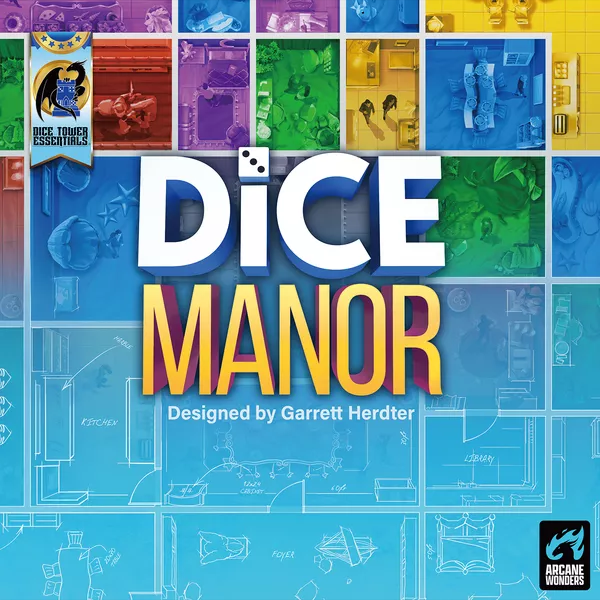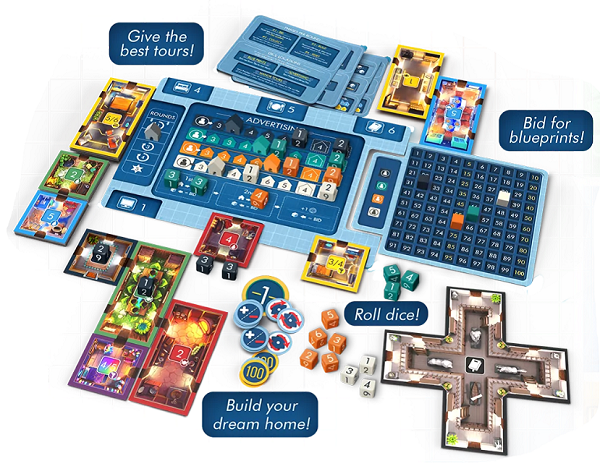Roll, Bid, and Build a Dream Home in Dice Manor

Build out a house, give home tours, and invest in advertisement, all to create the best dice manor on the market!
Published by Arcane Wonders, Dice Manor is a worker placement, tile-laying game for 2-4 players that plays in roughly 30-45 minutes.
Gameplay
Each player takes seven dice of their color and one entrance hall tile. This tile will be the start of their house. The game is played over the course of four rounds, with each round broken up into several phases.
The first phase is the bidding phase in which players take turns. When it is your turn, you roll all your remaining dice and then organize them by number. You may spend inspiration tokens during this phase to either reroll any number of dice or to change the number of a single die up or down by one digit. You then select one number that you rolled and must take all dice that rolled that number. You then spend these dice.
There are three choices of where to spend your dice, and you do not have to spend them all at the same location. Each round, there are always six building tiles available to be bid on. The different types of tiles require you to use different numbered dice to bid on them. You can also bid on the advertising track, where you can play any value of die, but once you’ve played at least one die all future dice you play on the track that round must have the same value.
Finally, you can use dice to give a tour of your house. Each house tile has a number on it. In order to place a die on a tile, the die’s value must match. When giving a tour, you must always start in your entrance tile and follow a connecting path of rooms going out from there. If you give another tour later on the same round, you branch off from any room where you have previously placed a die. Players immediately score points based on the number of dice they placed on the tour that turn. If you give another tour, later on that same round, that scores separately.
Players continue taking turns during this phase until all dice have been spent. You then move on to the resolution phase. For each house tile currently up for bid, the player who placed the most dice on it wins it. If there is a tie, it goes to the player who placed dice there first. All players who bid on a tile and do not win it, gain one influence token.
Next, advertising is resolved. The player who placed the most dice on advertising moves his player token two spaces up the advertising track, earning the points listed on each space. The player who placed the second most, moves his token one space up the track, earning the listed points, while all other players who bid on advertising earn one inspiration token. At the start of the game, each player puts two bonus dice at the end of the advertising track. At the end of each round, you move one of your bonus dice back down the track, towards your player token, one space for each die you spent on advertising (whether you won the bid or not). When your player token and one of your bonus dice meet, you collect the die and will add it to the dice you roll for the rest of the game.
All players then score one point for each die they have in their house currently, and then move on to the building phase. In this phase, you place any house tiles you won that round. Doors must meet doors, and you cannot place a door against a wall. You may rotate a tile before placing it, and a tile cannot block the front of the entrance tile. Everyone then takes back all their dice, new tiles to be bid on are drawn, and you start a new round.
After four rounds, you move on to the grand opening. All players roll their dice and, like in the bidding phase, you group them by number and choose a number you rolled to place. You then spend these dice to conduct a tour through your house, following the rules of a regular tour, only any dice you selected to spend that cannot be placed are instead set aside and count as an unhappy guest. Players continue rolling and conducting tours until all dice have been spent. You earn three points for each die in your house, and none for unhappy guests.
Players then score bonus points, earning points for having the most and second-most house tiles in each color, as well as having the house with the most rooms, and also earning points based on the number of different room types they have. Finally, you earn one point for each two unspent inspiration points you have leftover, and the player with the most points wins.

Review
Dice Manor might have a lot of little rules you have to learn, but once you get into the meat of the game, it’s a fairly smooth and simple process. You roll your dice, you choose a number, and you place those dice (similar to the game Las Vegas). Consequently, turns are fairly fast and, in fact, the whole game plays more quickly than you’d expect. Rounds go by at a nice, brisk pace.
Thematically, Dice Manor is very satisfying – watching your house grow, running tours, and collecting different room types. The artwork is nice and gives you a great overhead view of each room, and there’s a range of fairly standard rooms with ones that are more unusual.
We liked the choices presented to the players, and there’s even a little bit of push-your-luck. Maybe you really want that room tile that requires two’s to bid on it, but someone has already bid three two’s and you only rolled two of them this turn. You can spend your dice there and hope you roll more two’s later on in the round, but if you lose that bid then all you’re going to get is an inspiration token.
There’s also a balance with how quickly you spend your dice. All players are going to place all dice each round, but some players might place their dice more quickly than others. If you spend four dice in one go, and someone else is only spending one or two at a time, you’ll be done first. There is power in the position of being the last player left with dice, as you can make more informed decisions, while at the same time, ties are broken based on who placed dice somewhere first.
The tour mechanic also offers a fun little puzzle. You want to be able to place more dice in one go, as that makes the tours worth more points, and you’re placing dice all of a single number, so you’re trying to bid on tiles with numbers that will let you create longer runs of tours in your house. This ends up being tricky, as you also have to consider where the doors are on tiles and how you can line up rooms effectively. Meanwhile, you also want to keep in mind the end-game bonus points.
There are player aid cards, but we found some of the iconography on them a bit hard to decipher and would sometimes double-check in the rulebook. If playing with 3-4 players, this game is also going to take up a good bit of table space, so choose your gaming location accordingly.
Dice Manor is quite an enjoyable mixture of mechanics, with a thoughtful design that leads to some tricky decisions and a lot of jostling for tiles and advertisement between players.
Pros: Turns and rounds play quickly, it’s satisfying to build out your house, dice bidding mechanic is quite clever
Cons: Iconography on the player aid cards is confusing
Disclosure: We received a complimentary review copy of this game.







